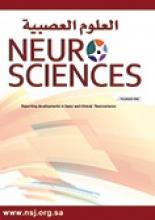Abstract
OBJECTIVE: The aim of this study was to identify factors that affect the outcome of patients with aneurysmal subarachnoid hemorrhage treated at King Khalid University Hospital (KKUH), Riyadh, Kingdom of Saudi Arabia.
METHODS: The medical records of 30 consecutive patients with verified ruptured cerebral aneurysm treated at KKUH between 1993 and 1996 were reviewed looking for factors that affect the outcome of surgery. Statistically significant factors were selected to design a scoring system for prediction of the outcome. This scoring system was then used to predict the outcome of the next 40 patients between 1997 and 2000.
RESULTS: The preoperative Hunt and Hess grade, amount of subarachnoid hemorrhage in computerized tomography scan, aneurysm size and progressive hydrocephalus were the most significant factors that affect the outcome. There was significant association between the score value and the outcome, patients with low scores had negligible morbidity and mortality.
CONCLUSION: The scoring system is simple, easily applicable and can be used to predict the outcome of patients with aneurysmal subarachnoid hemorrhage with a high degree of accuracy.
- Copyright: © Neurosciences
Neurosciences is an Open Access journal and articles published are distributed under the terms of the Creative Commons Attribution-NonCommercial License (CC BY-NC). Readers may copy, distribute, and display the work for non-commercial purposes with the proper citation of the original work.






